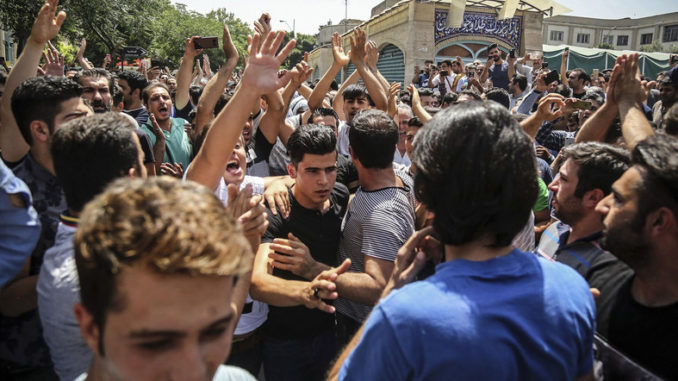
Source: NCRI Editorial
Hassan Rouhani’s recent remarks, warning the United States “not to play with the lion’s tail”, sparked a lot of reactions, both at home and at international level, with some suggesting that the remarks point to Rouhani’s two-fold strategy. But is there even a strategy out there?
Which strategy, seriously?
Already surrounded by a host of both domestic and international crises, the regime is too incapable to speak of a strategy, a well-calculated plan or a long-term roadmap. That’s a reality that even regime’s so-called political, economic and social experts now acknowledge.
As confirmed by regime officials, it’s now 40 years that the issue of resuming political ties with the United States has remained on the table as an unresolved predicament.
On one hand, the regime desperately needs to hold talks and establish relations with the United States, but on the other hand it is taken hostage by its own deceitful slogans, including ‘Death to America’. With the issue once again resurfaced, regime’s strategic bewilderment has been highlighted.
The tangled mess of a strategy
“Iran’s officials are suffering a strategic bewilderment. 40 years of ‘Death to America’ has failed to bring a real demise for the country. Infatuation and hatred found in US-Iran relations is the result of a black-white approach towards politics, and now we need a gray look to get rid of that,” writes state-run Iranian-Diplomacy –irdiplomacy.ir– website in an article titled ‘A difficult path towards peace’ on July 17, 2018.
“If it’s been decided to hold talks, which seems to be on the agenda, then let’s not make it difficult. We’d better not hold last minute talks or else we’ll once again be forced to accede to an urgent diplomacy. We have to directly enter into win-win negotiations rather than relying on mediators who are asking for their own share,” the website continues.
So, Rouhani and Khamenei’s remarks should also be interpreted with regard to such an atmosphere.
While Rouhani speaks of blocking the Strait of Hormuz only to ingratiate himself with regime forces and somehow lift their spirits, a few days later, however, he is forced to eat the humble pie by making the most irrelevant and ridiculous comment, saying “by blocking the strait, I didn’t mean to block the Strait of Hormuz, as there are a lot of straits out there and Hormuz is only one of them!”
On July 22, 2018, Rouhani once again threatened the United States, warning the country against playing with the lion’s tail. A remark that prompted a quick reaction from both the US president and Rouhani’s own circle as well, criticizing him for making such provocative remarks under such conditions.
It looks like regime officials have not yet fully grasped the fact that the page has turned, and that they can no longer intimidate others while the West’s flirtation policy is long gone. The mullahs, from top to bottom, are just beginning to understand that making such remarks is going to have heavy unconventional prices for the regime.
Khamenei-linked media welcome Rouhani’s remarks
Khamenei-linked media meanwhile have applauded Rouhani for his recent remarks and stances, saying this is the right path to go.
This might somehow be interpreted as an adopted strategy within the regime, especially considering that Khamenei had also recommended in his July-21 speech not to end talks with Europe, but at the same time not to tie-in the country’s economy with such talks, either; remarks that before anything else suggest an uncertain strategy and, as put by regime’s own experts, are rooted in regime’s strategic bewilderment.
What do regime’s so-called experts say?
“While we’re not allowed to sell oil and import necessary items, we should be thankful to Russia for providing us with goods so we won’t die from hunger. At the moment, we’re in a situation in which we have to choose between bad and worse. That’s why we have to give our oil to Russia and import necessary commodities in return,” said regime MP Hedayatollah Khademi on July 16, 2018.
Also on that same day, Khamenei-linked MP Gholamali Jafarzadeh said “those who encourage holding talks with the United States should keep in mind that eliminating the IRGC as well as the vilayat-e-faqih (Regime’s fundamental principle of guardianship of clergy) as the revolution’s 40-year old achievement, are the first two of the enemy’s 12 conditions.”
So, it becomes quite clear that it is in no way an exaggeration when we say the regime is not in a position to speak of a strategy or roadmap.
Does the regime have any other imaginable option?
Apart from what was already said, there’s still another option being discussed within the regime. Suggested by regime parliament speaker Ali Larijani, the solution suggests putting aside differences and turning to domestic development instead.
Larijani speaks in such a way as if regime’s rival bands could actually cast aside their differences and jointly adopt a specific policy in the face of crises that are shaking the foundations of the regime.
It doesn’t need much effort to prove that such a formula can’t work for regime’s rival bands that are continuously fighting for a higher share of power, as Larijani himself describes the obstacles his suggestion is faced with, “to succeed under such conditions, it’s necessary to first reach a common understanding of the situation, so that instead of dealing with superficial and immature political games, we put all our efforts into internal development.”
In other words, this suggests that even if the regime could overcome the obstacles unharmed, it will still be faced with rival bands’ conflict of interests which prevents any progress; something that’s best described as a real deadlock within another!

